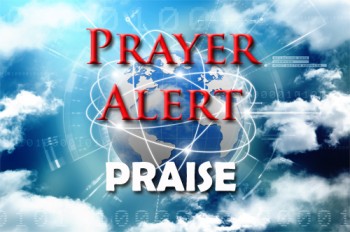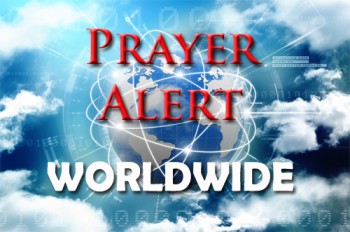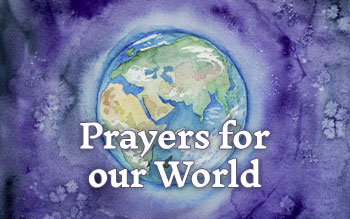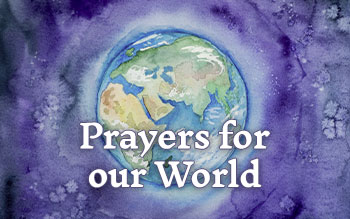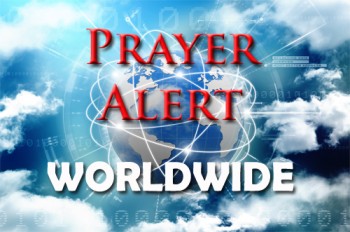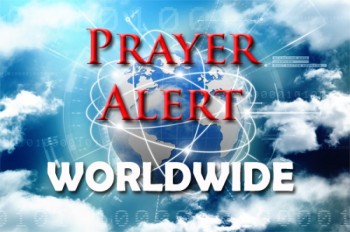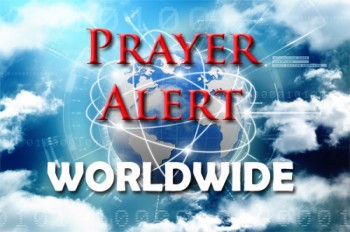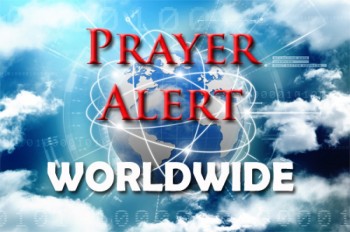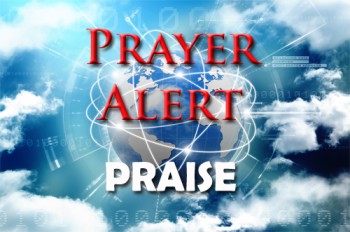Displaying items by tag: Africa
Where hope comes to life
Through Africa Renewal Ministries in Uganda abandoned babies, child sponsorship, and children's transition care programmes are bringing hope and renewal to thousands of vulnerable children. Each age-appropriate programme (0-19 years) focuses on discipleship, education, healthcare, and leadership. Participants include Loving Hearts Babies Home, Early Childhood Development Programme, Child Development Programme, Bethany Children's Village, and the Mwangaza Children's Choir.
Cameroon: Christian majority flee Boko Haram
Bishop Bruno Ateba of Maroua-Mokolo said that over 100,000 Christian Cameroonians have been made refugees within their own country as a result of a rise in attacks by Boko Haram. 70% of the population is Christian. The bishop said tourism has ceased and life has come to a standstill because of the terrorist crisis. Suicide bombings in Maroua, in the far north, killed over 30 people and injured hundreds. The recent suicide attacks were carried out by two young girls, forced by Boko Haram to conceal bombs under their burkas and detonate their weapons in public places. In an appeal to international governments, Bishop Bruno said, ‘Help us to achieve peace. The international community has all the resources to put an end to the terrorism of Boko Haram.’ In a letter to all the faithful of his diocese, Bishop Bruno called them to pray and be watchful.
Sudan: a price for revolution
Falafel is a cheap fast food usually snapped up quickly on the streets of Sudanese cities. But now Sadiya Seror sits with unsold trays of her chickpea patties. ‘These days people eat one meal a day; they forget the idea of three meals,’ Seror said, waiting for customers at her market stall. If you want to buy a meal for your family, it will cost around 175 Sudanese pounds. Before, the same amount would feed a family of five for three to five days.’ ‘Before’ is a reference to life prior to the pro-democracy protests that ended the 30-year corrupt regime of President Omar al-Bashir. A power-sharing deal is currently being negotiated between the military council and the civilian protesters, but what is proving harder to resolve, and dimming hopes for real change, is the impact of poverty and rising prices on a large and growing percentage of the population.
Nigeria: Trump Honours Muslim Cleric Who Saved 262 Christians From Death
"The Trump administration honored a Nigerian Muslim Imam last week among its first-ever International Religious Freedom Award winners for his efforts that saved hundreds of Christians during a 2018 terrorist attack," reports LifeSiteNews.
"Imam Abubakar Abdullahi of Nigeria selflessly risked his own life to save members of another religious community, who would have likely been killed without his intervention," the proclamation from the U.S. Department of State said.
Abdullahi had hidden 262 Christians in his home and mosque during a terrorist attack, when, "On June 23, 2018, ethnic Fulani herdsmen, who are predominantly Muslim, launched coordinated attacks on 10 villages in Barkin Ladi, killing hundreds of ethnic Berom farmers, who are predominantly Christian."
The 83-year-old cleric was one of five people honored at a July 17 ceremony with Secretary of State Mike Pompeo and International Religious Freedom Ambassador Sam Brownback.
The State Department proclamation additionally states:
As Imam Abdullahi was finishing midday prayers, he and his congregation "heard gunshots and went outside to see members of the town’s Christian community fleeing," the State Department added. "Instinctively, the Imam ushered 262 Christians into the mosque and his home next to the mosque. The Imam then went outside to confront the gunmen and he refused to allow them to enter, pleading with them to spare the Christians inside, even offering to sacrifice his life for theirs. Although the gunmen killed 84 people in Nghar village that day, Imam Abdullahi’s actions saved the lives of hundreds more.
"Instinctively, the imam gave refuge to his Christian neighbors, sheltering 262 Christians in his mosque and his home," Brownback told those attending the award ceremony. "Imam Abdullahi stood outside the doors confronting the Muslim attackers, pleading with them to spare the lives of the Christians inside, even offering to exchange his own life for theirs."
"His actions bear witness to true courage, true selflessness, and true brotherly love," stated Brownback.
[Dr. Chaps' comment: Love is a universal religion, and I respect this man who rejected the false prophet's teaching to slay the infidels (Christians) and instead protected them. Now let's stop funding radical Islamists who kill Christians.
TODAY AT OUR WEDNESDAY PRAYER MEETING IN COLORADO SPRINGS, WE DECLARED THAT WE STAND AROUND TOP LEADERS OF OUR NATION PRESIDENT, VICE PRESIDENT POMPEO, Sam Brownback, RAISE OUR SHIELDS OF FAITH TO PROTECT THESE GODLY MEN. IF AN OLD IMAM COULD SAVE 262 LIVES, GOD WILL PROTECT OUR LEADERS AS WE STAND FOR THEM IN PRAYER.
WE KNOW THERE ARE SO MANY ENEMIES SURROUND OUR LEADERS.
TC Kim - Facilitator
Transform USA
More at:http://www.transformusa.org
More than 60 dead as Boko Haram extremists target funeral in Nigeria
The latest atrocity is believed to be in retaliation to an incident when villagers fought off a Boko Haram attack two weeks ago.
The attack on civilians is the deadliest in the region so far this year.
Eleven other people were wounded during the midday attack in Budu near Maiduguri on Saturday, according to Muhammad Bulama, council chairman of the Nganzai local government area.
Bunu Bukar, secretary of self-defence group Borno Hunters Association, said the extremists were on motorbikes and opened fire on villagers.
He added that his colleagues had recovered nearly two dozen bodies.
Mr Bulama said the atrocity was in retaliation to an incident when villagers fought off a Boko Haram attack in the area two weeks ago.
Last week Nigerians marked the 10th anniversary of the Boko Haram insurgency which has killed tens of thousands of people, displaced millions and created one of the world's biggest humanitarian crises.
The extremists have carried out mass abductions of schoolgirls and deployed young women and men in suicide vests to attack markets, mosques and other highly populated areas.
Their aim is to impose strict Islamic rule in the region.
Boko Haram have broadened their attacks and carried out atrocities in neighbouring Chad, Niger and Cameroon.
Reporting by Sky News
Pray: For the military and intelligence services to root out and bring these militants to justice.
Pray: For the victims and their families – for healing and comfort in their grief.
Pray: For an end to this ongoing campaign by Boko Haram.
Nigeria: pregnant mother among five Christians killed
Muslim Fulani herdsmen are attacking churches in north-central Nigeria and crippling productive activities. Attacks have heightened, with one village or another attacked nearly every day. The most recent attack reported in the media was in Jos where a pregnant mother of two and three other Christians were killed by Fulanis. They also attacked other Christian communities, burning down 75 houses with food stores and two church buildings. The herdsmen beheaded a church elder after killing him. ‘We have been experiencing daily attacks by these Fulani herdsmen in our communities, most especially on Sundays during worship hours or Thursdays when church activities are held,’ said a pastor. The herdsmen also destroyed farm produce worth millions of naira, and a lot of domestic animals were killed in the attacks. Christians make up 51.3% of Nigeria’s population; Muslims account for 45%.
Africa: Corruption
A survey asked over 47,000 citizens from 35 African countries about their experiences and perceptions of corruption. More than half of the survey respondents think corruption in their country is getting worse, and that their governments are not doing enough to tackle this scourge. Citizens have every reason to call for stronger anti-corruption measures: from education to health care to policing, rackets affect millions of people each-and-every day. More than a quarter of citizens paid bribes to access public services over the past year - that is equivalent to around 130 million people across the countries surveyed. Of all public institutions, police forces were identified as the most corrupt; but many other areas of government are also seen by citizens as corrupt. The good news is that the majority of people are optimistic that they can make a difference in the fight against corruption.
Congo: UN system-wide approach as Ebola spreads
The number of new Ebola cases is at worrying levels and now the virus has reached Goma City, the Central Africa transport hub, where 2 million people live. A Pastor, who had become ill in Butembo travelled to Goma on 14 July and died in its treatment centre. All passengers on the bus the Pastor had taken to Goma have been traced. Butembo is one of the towns hardest hit by Ebola. The pastor held regular services in seven churches there and laid his hands on worshippers, including sick people. Over 1,650 people have died and about 700 people have recovered from Ebola. Currently there are 2,489 cases. The movement of people around or through Ebola zones is a huge challenge for health services. Provinces affected by the virus are characterised by poor infrastructure, political instability and ongoing conflict involving scores of armed militia groups and community mistrust of national authorities and outsiders. The World Health Organisation has sounded a global Ebola alarm see.
Mali: entire Christian village massacred
Between 100 - 135 people were slaughtered by heavily-armed Islamist extremists in a mainly-Christian village in the Mopti region of central Mali. Barnabas Fund described it as the ‘worst Mali massacre since 1946’. The jihadists encircled the isolated village of ethnic Dogon people at night and set fire to ‘everything’ in a ‘well-targeted attack’. All the victims were shot dead or burnt to death; some were charred beyond recognition, making it difficult to identify them. They set fire to all who ran and all who did not dare to go out. Only a few men escaped the gunfire. A survivor said, `About 50 heavily armed men arrived on motorbikes and pickups, surrounded the village and then killed anyone who tried to escape. No-one was spared – women, children and elderly.’ Since 2018 many Christians have been killed, abducted or forced to flee, with churches ransacked in an attempt to establish sharia law.
Egypt: a miraculous healing
13-year-old Rosaline was in the late stages of kidney failure, but her symptoms were misdiagnosed as food poisoning. Eventually, her doctors discovered that she had acute and permanent kidney failure and would have to be on dialysis all her life. After receiving regular five-hour dialysis treatments her symptoms worsened. The doctors didn’t expect her to survive. But her Christian faith remained steadfast. ‘My mum cried but I told her not to, because God’s timing is right’, Rosaline said. ‘I had faith in the Lord that He would heal me’. Her Sunday school teacher, Mariam, phoned Christian broadcasting station SAT-7 to ask for prayer for Rosaline. She prayed with the audience and production team live on the programme. Within a week, Rosaline’s kidneys were performing normally. Everyone was amazed at the miracle. ‘God is the greatest physician.’ said her father.
